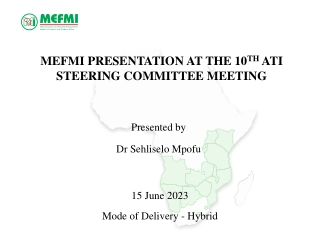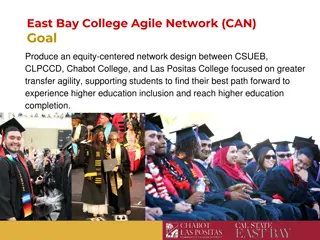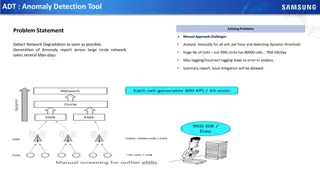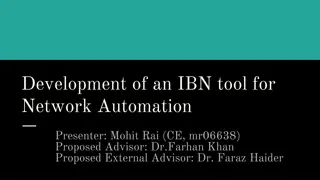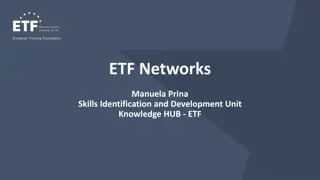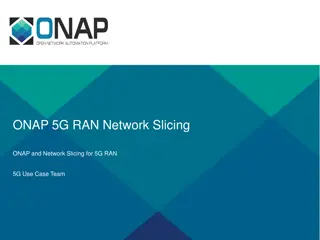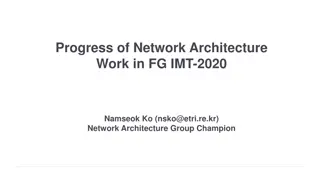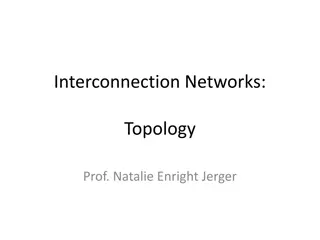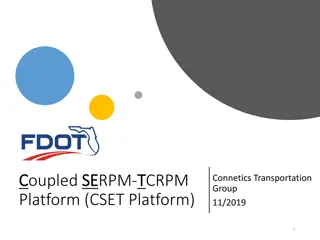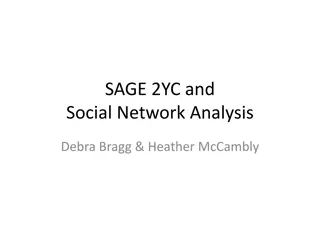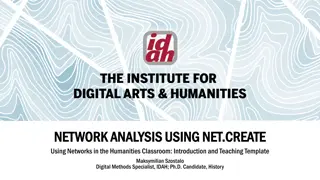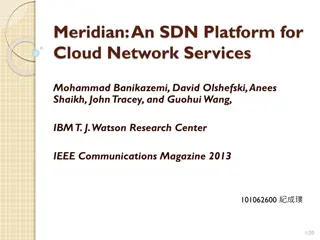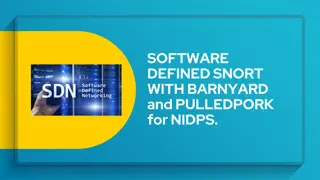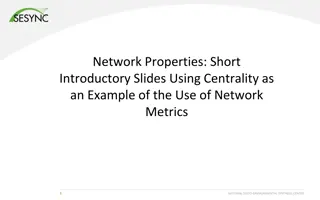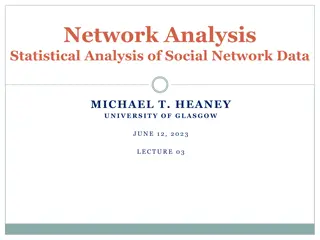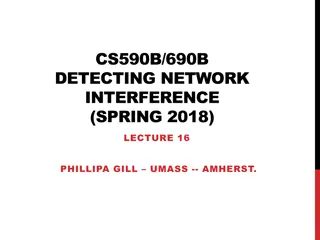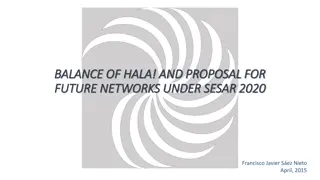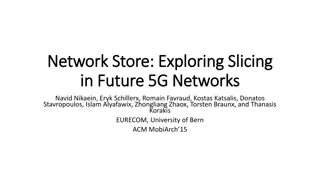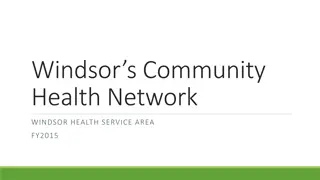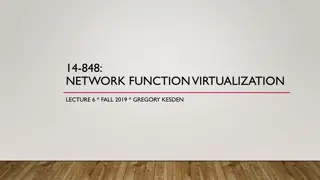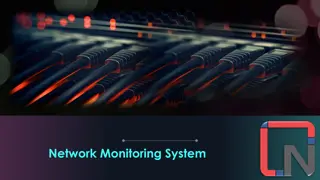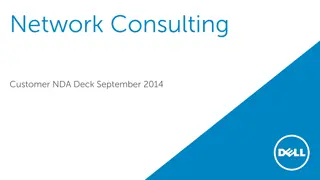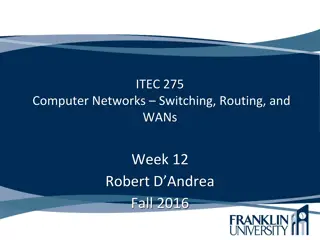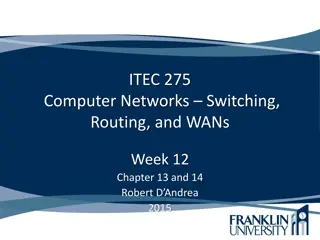Foreign Collaboration
Foreign collaboration refers to partnerships between local and international businesses to leverage technology, research, and economic development. In India, types of foreign collaboration include marketing, financial, technical, and consultancy collaborations, each offering unique benefits for busi
0 views • 5 slides
MEFMI Presentation on Collaboration and Capacity Development with ATI and IMF
The Macroeconomic and Financial Management Institute of Eastern and Southern Africa (MEFMI) presented on their collaboration with the African Training Institute (ATI) and the International Monetary Fund (IMF) at the 10th ATI Steering Committee meeting. The collaboration includes joint regional cours
1 views • 7 slides
Equity-Centered Agile Network Design for Higher Education Inclusion
The East Bay College Agile Network (CAN) aims to create an equity-centered network design between CSUEB, CLPCCD, Chabot College, and Las Positas College to enhance transfer agility and support students in finding their best path towards higher education inclusion and completion. The network focuses
0 views • 31 slides
Apache MINA: High-performance Network Applications Framework
Apache MINA is a robust framework for building high-performance network applications. With features like non-blocking I/O, event-driven architecture, and enhanced scalability, MINA provides a reliable platform for developing multipurpose infrastructure and networked applications. Its strengths lie i
3 views • 13 slides
Modeling and Generation of Realistic Network Activity Using Non-Negative Matrix Factorization
The GHOST project focuses on the challenges of modeling, analyzing, and generating patterns of network activity. By utilizing Non-Negative Matrix Factorization (NMF), realistic network activity patterns can be created and injected into live wireless networks. Understanding and predicting user behavi
4 views • 28 slides
Automated Anomaly Detection Tool for Network Performance Optimization
Anomaly Detection Tool (ADT) aims to automate the detection of network degradation in a mobile communications network, reducing the time and effort required significantly. By utilizing statistical and machine learning models, ADT can generate anomaly reports efficiently across a large circle network
8 views • 7 slides
Borders Climate Action Network Overview
Borders Climate Action Network aims to achieve a net-zero and climate-resilient Scottish Borders through a self-organising, inclusive network supporting communities. The network provides capacity building, gap identification, and interconnections to foster community actions. The approach focuses on
0 views • 8 slides
Revolutionizing Network Management with Intent-Based Networking
Explore the concept and benefits of Intent-Based Networking (IBN) in simplifying network configuration and enhancing efficiency. Learn how IBN automates network operations, aligns with business objectives, improves security, and ensures scalability and reliability. Discover the potential of IBN tool
0 views • 14 slides
Advancing Vocational Excellence: The ETF Network for Skills Development
The ETF Network, led by Manuela Prina, focuses on skills identification, development, and peer learning to enhance vocational education excellence. Through partnerships with multiple countries and institutions, the network promotes collaboration, innovation, and knowledge sharing to address emerging
1 views • 9 slides
A Decade of Collaboration and Transformation in West Belfast Schools
The West Belfast Area Learning Community and the West Belfast Partnership Board embarked on a journey of improvement through collaboration from 2007 to 2017. Initially facing challenges, schools transitioned from isolation to collaboration, driven by policy changes and the need for sustainable pract
1 views • 12 slides
Network Compression Techniques: Overview and Practical Issues
Various network compression techniques such as network pruning, knowledge distillation, and parameter quantization are discussed in this content. The importance of pruning redundant weights and neurons in over-parameterized networks is highlighted. Practical issues like weight pruning and neuron pru
0 views • 37 slides
Network Slicing with OAI 5G CN Workshop Overview
Overview of Network Slicing with OAI 5G CN workshop focusing on the crucial role of network slicing in realizing the service-oriented 5G vision. This workshop covers topics like multiple logical networks creation on shared infrastructure, different types of network slices, preparation and instantiat
1 views • 6 slides
Network Design Challenges and Solutions in Business Data Communications
Issues in designing a Local Area Network (LAN) include needs analysis, technological design, and cost assessment. The traditional approach involves structured systems analysis, but faces challenges due to rapidly changing technology and increasing network traffic. The Building Blocks Approach recomm
1 views • 20 slides
Understanding 5G RAN Network Slicing and Architecture
Explore the intricate world of 5G Radio Access Network (RAN) and Network Slicing, delving into concepts such as SO Service Orchestrator, SDN-C Service Design, and Core Network Elements. Discover the significance of managing and designing mobile slice services, including eMBB, Massive IoT, and Missio
0 views • 26 slides
Understanding Snort: An Open-Source Network Intrusion Detection System
Snort is an open-source Network Intrusion Detection System (NIDS) developed by Cisco, capable of analyzing network packets to identify suspicious activities. It can function as a packet sniffer, packet logger, or a full-fledged intrusion prevention system. By monitoring and matching network activity
0 views • 23 slides
Data Flows and Network Challenges in Particle Physics Infrastructure
This overview delves into the data flows and network challenges faced in particle physics infrastructure, focusing on the JUNO project. It discusses the process of data reception, storage, and replication across various data centers, highlighting the bidirectional nature of data flows. Additionally,
0 views • 24 slides
International Collaboration in Open Source Software: A Network Analysis Study
This research project delves into the realm of open source software (OSS) by using web scraping and network analysis to understand international collaboration dynamics. It explores the significance, scope, and impact of OSS, focusing on the structure of collaboration networks, contributions of diffe
1 views • 23 slides
Progress of Network Architecture Work in FG IMT-2020
In the Network Architecture Group led by Namseok Ko, significant progress has been made in defining the IMT-2020 architecture. The work has involved gap analysis, draft recommendations, and setting framework and requirements. Phase 1 focused on identifying 19 architectural gaps, such as demands for
1 views • 11 slides
Regional Gender and Diversity Network Initiatives in Southeast Asia
The Southeast Asia Regional Gender and Diversity Network focuses on promoting gender and diversity initiatives within National Societies. The network conducts teleconferences, annual meetings, and capacity-building sessions to enhance collaboration and strategic direction. Through the endorsement of
0 views • 11 slides
Understanding Interconnection Networks Topology
Exploring the topology of interconnection networks helps determine the arrangement of channels and nodes, impacting network cost, performance, latency, energy consumption, and complexity of implementation. Abstract metrics such as degree, hop count, and network diameter play crucial roles in evaluat
1 views • 56 slides
Transportation Network Modeling and Analysis with C.Coupled SE Platform
This content outlines the features and functionalities of the C.Coupled SE Platform (CSET Platform) developed by the Connetics Transportation Group. It covers aspects such as interface design, inputs merging, purposes, platform development using Cube, TAZs merging, and network attributes. The platfo
0 views • 11 slides
Understanding Social Network Analysis (SNA) in SAGE 2YC
Explore the concept of Social Network Analysis (SNA) and its application in the SAGE 2YC network. Discover how SNA reveals relationships within networks, observe changes over time, and delve into examples and future opportunities for conducting SNA. Take a survey to share your insights on network gr
0 views • 7 slides
Human Disease Symptom Network: Understanding Disease Relationships Through Symptoms and Genes
The Human Disease Symptom Network (HSDN) is constructed using a large-scale medical bibliographic records database to form a network of human diseases based on symptom similarities. By integrating disease-gene associations and protein-protein interaction data, correlations between symptom similarity
0 views • 37 slides
Introduction to Network Analysis Using .NET
This presentation introduces the concept of network analysis using .NET in the humanities classroom. It provides a template for teaching and adapting network analysis tools for educational purposes. The guide explains the relevance of networks in processing and visualizing data, emphasizing the coll
0 views • 20 slides
Meridian: An SDN Platform for Cloud Network Services
Meridian is an SDN platform developed by Mohammad Banikazemi, David Olshefski, Anees Shaikh, John Tracey, and GuohuiWang at IBM T. J. Watson Research Center. The platform focuses on providing cloud network services efficiently. It encompasses an architecture that enables faster and more convenient n
0 views • 21 slides
Enhancing Network Security with Software-Defined Snort and OpenFlow
Explore the implementation of Snort, Barnyard, and PulledPork within a Software-Defined Network framework using OpenFlow technology. Learn how these tools enhance network security through intrusion detection engines, rule management, and network traffic control mechanisms. Dive into the architecture
0 views • 15 slides
Understanding Network Metrics Through Centrality Analysis
This presentation introduces network metrics as tools to describe network characteristics and answer important questions. Using centrality metrics as an example, participants learn how to identify the most important nodes in a network based on different criteria such as degree centrality and closene
0 views • 15 slides
Understanding Network Analysis: Whole Networks vs. Ego Networks
Explore the differences between Whole Networks and Ego Networks in social network analysis. Whole Networks provide comprehensive information about all nodes and links, enabling the computation of network-level statistics. On the other hand, Ego Networks focus on a sample of nodes, limiting the abili
0 views • 31 slides
Swiss Citizen Science Network Conference Highlights 2018
The Swiss Citizen Science Network Conference held in May 2018 in Bern witnessed insightful discussions, presentations, and feedback on the network's activities and future directions. Key topics included community engagement, the role of media, and upcoming events like the ECSA Conference. Participan
0 views • 8 slides
Understanding Network Interference in CS590B/690B Lecture
Delve into the realm of network interference through the CS590B/690B lecture with Phillipa Gill at UMass Amherst. Explore topics such as Internet routing, timing attacks, BGP hijacks, Tor network functionality, relay selection, collusion scenarios, use of guards, web site fingerprinting attacks, tra
0 views • 11 slides
Stockholm Dual Career Network: Empowering Expat Partners in Stockholm
Stockholm Dual Career Network (SDCN) focuses on supporting expat partners in Stockholm by offering career development workshops, social events, language training, and more. Run by Staf in collaboration with SDCN Management, the network welcomes partners of international employees, providing a platfo
0 views • 10 slides
Contribution of HALA Network to ATM Community and SESAR 2020: Achievements and Future Directions
HALA network has been instrumental in fostering research and innovation in the field of automation for ATM systems, providing a platform for knowledge dissemination, collaboration, and advancement. The network has facilitated exploratory research, encouraged young scientists' participation, and crea
0 views • 12 slides
Exploring Network Slicing in Future 5G Networks
The research delves into the design of a 5G-ready architecture known as NFV-based Network Store, aiming to serve as a digital distribution platform for 5G applications. By focusing on network slicing and programmability, the architecture enhances resource efficiency and agility in deploying software
0 views • 17 slides
Understanding Community Health Networks in Windsor: A Social Network Analysis
Exploring the network of organizations in the Windsor Health Service Area (HSA) to support population and individual health through collaboration and relationships. The study delves into the impact, connections, and characteristics of these networks, utilizing social network analysis to quantify, vi
0 views • 19 slides
Network Function Virtualization (NFV) Overview
Network Function Virtualization (NFV) focuses on virtualizing network functions to improve efficiency and reduce costs in network infrastructure. The lecture discusses key readings, devices that compose a network, specialization of devices, benefits of one-device-does-anything approach, and the goal
0 views • 21 slides
Enhancing Network Stability with Network Monitoring Systems
Network monitoring is crucial for efficient management and proactive issue detection in a network environment. Factors influencing an effective network system include choosing the best OEM, SLA agreements, and selecting a reliable System Integrator. Reactive monitoring can lead to financial losses a
0 views • 12 slides
Local Network and File Sharing Workshop Overview
Exploring the concepts of local area networks (LANs), intranets, and practical aspects of sharing files and printers on a network. The workshop delves into the structure of the University of Alkafeel network, including hotspot settings and ad hoc network configurations. Learn about USB printer shari
0 views • 30 slides
Dell Network Consulting Services Overview
Dell Network Consulting provides expert insights and workshops to enhance your network infrastructure's efficiency. Services include network assessments, topology discovery, traffic analysis, and wireless site assessments. Deliverables include detailed reports, remediation plans, and infrastructure
1 views • 5 slides
Understanding Network Testing in Modern Computing Environments
Today, network connections are essential for various computing tasks, from accessing the internet to setting up local area networks. This article delves into the importance of evaluating existing networks, testing network performance, and ensuring stable connections for optimal user experience. It d
0 views • 46 slides
Understanding Network Testing for Efficient Connectivity
Today, network connections play a vital role in both home and company environments. Ensuring a stable and fast network connection is essential for optimal performance. Various network testing tools are available, including LAN Speed Test and Internet Speed Tracker Extension, to help assess and impro
0 views • 48 slides

